Surajeet Das Gupta, Mansi Taneja in New Delhi
Well, for Bharti Airtel subscribers, it definitely is over. Last week, the country's largest mobile operator hiked its mobile tariffs on some plans by 20 per cent across six circles which constitute over 37 per cent of its wireless revenues.
This includes pre-paid calls on both their network as well as calls to phones on other ones.
It is not as if the tariff hike has taken the industry completely by surprise. Most telecom watchers say that they were expecting operators confronted with squeezed margins and high debt to pull the rug sometime soon.
The signs were already there. First, the relentless fall in tariffs kick-started by new operators last year in order to acquire new subscribers bottomed out.
...
Is the telecom tariff party over in India?
Then, just a few weeks ago, Tata DoCoMo made a tentative move by doubling its own-net tariffs in its GSM service in Tamil Nadu and stealthily followed it up in six more circles (own-net calls of 1 paisa for six seconds were made for three seconds).
Of course, when the market leader does it, everyone sits up and takes notice. Now the question being asked is whether all the key telecom companies will follow suit.
The market has already given a thumbs-up to telecom stocks which have been languishing for months in the hope that margins will improve. "Other operators are likely to follow Airtel in the next few weeks," says Romal Shetty, telecom analyst at KPMG.
...
Is the telecom tariff party over in India?
Photographs: Reuters
"Mobile number portability won't make such a difference since subscribers go for brand and quality first. Pricing factor comes at the end", he adds.
Edelweiss is even more specific, saying that it expects Vodafone as well as Idea Cellular to follow suit with their own price hikes in the near future.
Truth is, Telcos are exceedingly cautious in their approach. "It's a good move, but we have to wait and see as to whether the hike will lead to a substantial churn or decrease in minutes of usage for Bharti", says a CEO of one of the leading incumbent Indian telecom company which has not taken a call on hiking tariffs.
...
Is the telecom tariff party over in India?
"If it does, no one will follow suit. If it doesn't, we all will increase. The next two to three months is crucial," he adds.
New operators are divided on their approach. No one wants to divulge their plans but at least one of them has said that this could just be the opportunity they've been looking for.
"With around 170 million subscribers, Bharti might not be looking for more customers as it is looking at consolidation of its subscriber base and better revenues, but we are different because our networks are empty," says an executive director of one of the new operators. "So we should go whole hog and not cut tariffs," he adds.
...
Is the telecom tariff party over in India?
Others say a price hike could be hara-kiri for the newbies. "Surely an increase in tariffs provides an opportunity to the new players. But they are not in a financial position to aggressively push for acquisition as the cost of getting a new subscriber is very high."
Other say they will also have to follow suit. Argues Ernst & Young analyst Akshay Grover, "With compressed margins, incumbents have no option left, except to go for an increase in tariffs. New operators had taken an aggressive stand initially. But some have not even rolled out their network, while others are affected by the 2G scam."
Even Bharti is clearly testing the waters. Rather than go pan-India with the hikes, the company also paradoxically announced tariff cuts in circles where they already have a strong leadership position and a revenue market share ranging from 28 per cent to over 45 per cent.
...
Is the telecom tariff party over in India?
More importantly, in all of these circles, its average revenue per user is 7 to 80 per cent more than rivals like Vodafone and Idea.
It is hardly rocket science as to why Bharti and the other operators need a tariff correction upwards. Airtel has stacked up huge debts to the tune of around Rs 60,000 crore (Rs 600 billion) which it has used to fund Zain's expansion as well as for its 3G business.
Cut throat competition from new players have forced it to bring down tariffs too, so its average revenue per minute(ARPM) has gone down according to analysts from 53 paisa in first quarter of 2010 to around 43 paisa currently.
...
Is the telecom tariff party over in India?
"Earlier the ARPM of Bharti was as high as 64 paisa. Now it is 43," says a senior analyst at Angel Broking. "The tariff increase will help them in arresting the large fall here and limit margin decline ," he adds.
Telcos say that since most of the well run firms currently have an operating cost of 25 paisa per minute, there is only limited scope of bringing it down even further, so a change in the tariffs by a few paisa can make a lot of difference.
"Operators have no choice except to increase tariffs," says Grover. "They have tried reducing their cost structure, and have made their system less capital expensive, but beyond a point it is not sustainable."
...
Is the telecom tariff party over in India?
Photographs: Antony Njuguna/ Reuters
The fear is whether a tariff increase will prove detrimental to operators or not. Will it lead to more churn especially when customers have choice of number portability?
And will this provide a door for new players to acquire large volume of customers from the incumbents like Bharti? The other danger is that consumers might talk less thus negating the goal of the tariff increase entirely.
But most incumbent operators as well as experts say they do not expect any major churn for two reasons: One, in most of these circles, Bharti is already commanding a 7-10 per cent tariff premium, because it has a pan India network, offers more variety of services including 3G and even BWA and has a strong brand presence unlike new players which do not.
So, customers are either not shy about paying a bit more for a better service or they end up talking less.
...
Is the telecom tariff party over in India?
Photographs: Vijay Mathur/Reuters
Two, new operators have frozen investments due to the financial crunch , so they are not growing their network or expanding to new cities and towns to match that of companies like Bharti.
The other concern is whether higher tariffs will slow down the incremental subscriber additions even further.
Simply put, the fear is, whether higher tariffs will discourage new customers to use mobile phones.
...
Is the telecom tariff party over in India?
Photographs: Reuters
"The churn rate has gone up to 14 per cent per month while incremental net adds are at 8-10 million , the industry would be happy if net adds go down to 4-5 million but churn comes down to half. It is accretive for the industry, were customers are running on a treadmill and cost of acquisitions of a new subscriber is leading to huge cash burn" says a CEO of a leading telco.
The strategy seems clear. India is no longer just a new market for telecom where subscriber acquisition is the key.
It is now becoming a matured market - not completely saturated like the US and Europe in terms of growth, but one in which rising revenues from existing customers is becoming increasingly important for profitability. That is what Bharti has kick started.
...
Is the telecom tariff party over in India?
Photographs: Stefan Wermuth/Reuters
It can also do so because the rules of spectrum are also about to change. Says Mahesh Uppal, a telecom analyst: "Bharti has no compulsion of getting numbers early when more spectrum was tied to subscriber base. Now it is clear that all spectrum will be auctioned".
The writing is clearly on the wall for Indian customers looking for rock bottom tariffs -which are in fact, the cheapest in the world.
Grab your wallets - your free telecom ride is over.

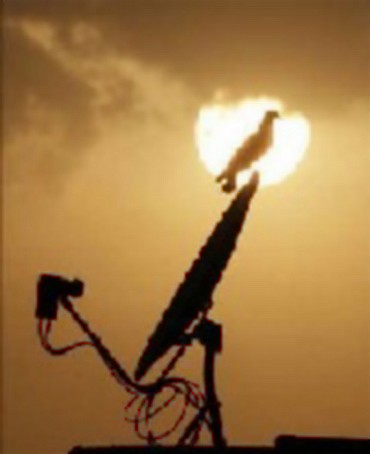



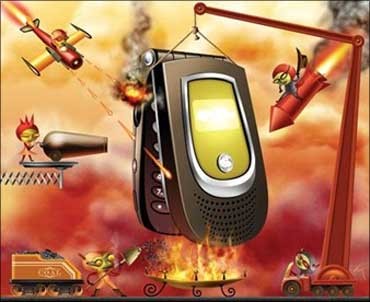

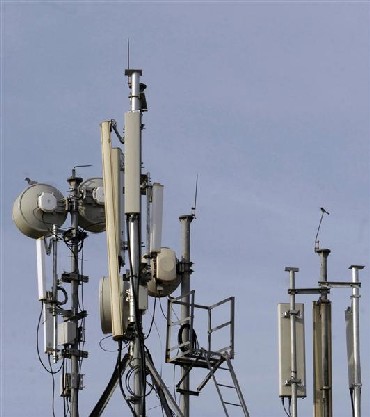
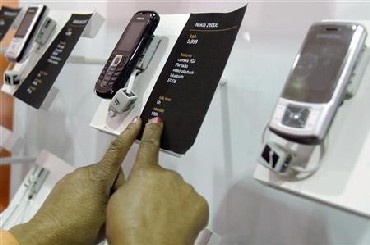

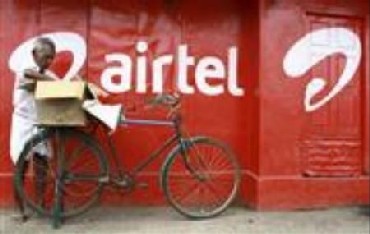
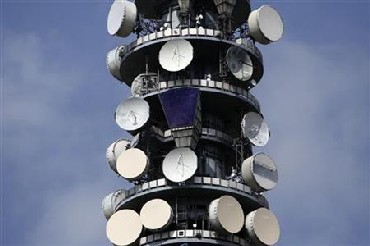

article